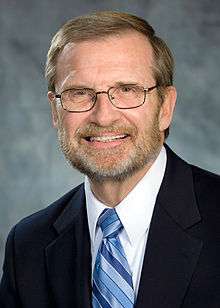Philip Sharp (politician)
| Philip Sharp | |
|---|---|
 | |
| Member of the U.S. House of Representatives from Indiana's 2nd district | |
|
In office January 3, 1983 – January 3, 1995 | |
| Preceded by | Floyd Fithian |
| Succeeded by | David M. McIntosh |
| Member of the U.S. House of Representatives from Indiana's 10th district | |
|
In office January 3, 1975 – January 3, 1983 | |
| Preceded by | David W. Dennis |
| Succeeded by | Andrew Jacobs, Jr. |
| Personal details | |
| Born |
Philip Riley Sharp July 15, 1942 Baltimore, Maryland |
| Political party | Democratic |
Philip Riley Sharp (born July 15, 1942) is an American politician and nonprofit executive who served in the United States House of Representatives as a Democratic representative from Indiana from 1975 to 1995.
Early life and education
Sharp was born in Baltimore, Maryland, in 1942. He grew up in Elwood, Indiana. After graduating there from Wendell Willkie High School in 1960, he attended DePauw University in 1961 before going on to graduate cum laude from the Edmund A. Walsh School of Foreign Service at Georgetown University in 1964. He then went on to do graduate work at Exeter College, Oxford University in 1966 before returning to Georgetown University to earn his Ph.D. in 1974, when he was elected to Congress.
Later years
During his years in Congress, Sharp participated in the passage of major energy legislation. As chairman of the Energy and Power Subcommittee, he played key roles in the 1990 Clean Air Act Amendments and the 1992 Energy Policy Act. He was a member of the National Research Council Committee on Effectiveness and Impact of Corporate Average Fuel Economy (CAFE) Standards, which issued its major report in 2001. He also chaired the Secretary of Energy's Electric Systems Reliability Task Force, which issued its major report in 1998.
In 1988 and 1990, Sharp defeated future U.S. Vice President Mike Pence.[1] Sharp chose not to seek re-election in the 1994 elections, and was succeeded by Republican David M. McIntosh.[2]
Sharp went on to serve as director of the Institute of Politics at Harvard University's John F. Kennedy School of Government. In 2005, he became president of the nonpartisan think tank Resources for the Future in Washington, D.C.
Sharp serves on the Board of Directors of the Duke Energy Corporation and as vice chair on the Board of the Energy Foundation. He is the congressional chair for the National Commission on Energy Policy, is a member of The National Academies’ Committee on America’s Climate Choices and the Blue Ribbon Commission on America's Nuclear Future. Before joining RFF, Sharp was Senior Policy Advisor of the Washington, DC based law and public policy firm Van Ness Feldman.[3]
References
- ↑ Helderman, Rosalind (15 July 2016). "Mike Pence used campaign funds to pay his mortgage — and it cost him an election". Washington Post. Retrieved 28 July 2016.
- ↑ "THE 1994 ELECTIONS: STATE BT STATE; Midwest". New York Times. 9 November 1994. Retrieved 28 July 2016.
- ↑ "Phil Sharp - HuffPost". www.huffingtonpost.com.
External links
- United States Congress. "Philip Sharp (id: S000294)". Biographical Directory of the United States Congress.
- Phil Sharp at Resources for the Future
- Biography from the John F. Kennedy Jr. Forum
- Philip R. Sharp Papers Archives and Special Collections, Ball State University Libraries (PDF)
- Appearances on C-SPAN
| U.S. House of Representatives | ||
|---|---|---|
| Preceded by David W. Dennis |
Member of the U.S. House of Representatives from Indiana's 10th congressional district 1975–1983 |
Succeeded by Andrew Jacobs, Jr. |
| Preceded by Floyd Fithian |
Member of the U.S. House of Representatives from Indiana's 2nd congressional district 1983–1995 |
Succeeded by David M. McIntosh |

